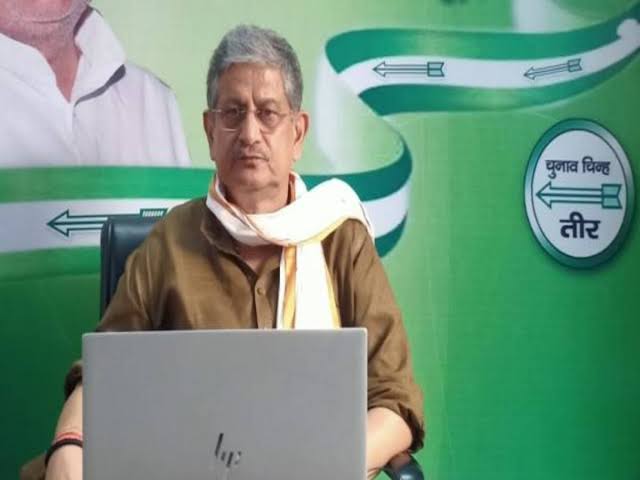Singh’s appointment came as a surprise for many within the political circles of Patna and New Delhi.
With the appointment of Rajiv Ranjan Singh alias Lalan Singh as the president of the Janata Dal United (JDU), its supreme leader and Bihar’s Chief Minister Nitish Kumar has silenced all speculation, tried to change the functioning of the party’s organization and give the upper castes of Bihar a message. Many believe that the party will see a transformation from a bureaucratic functioning style to a political functioning style under the new party president who had connections with the ground and had been a founding member of the Samata Party along with Nitish Kumar.
“There is a new energy among the workers of the party as Lalan babu has been the founding member of the Samta Party along with Nitishji; moreover the general workers are jubilant as they had seen the instrumental role played by Lalan babu in fighting the Jungalraj of theRashtriya Janata Dal (RJD) during the 1990s,” Neeraj Kumar, the chief spokesperson of JDU told The Sunday Guardian from Patna. “As the state president of the party between 2005-09, it was his organizational capacity which helped the JDU emerge as the largest party with 115 seats in Bihar during the 2010 Assembly polls, and that had been appreciated time and again by our leader Nitishji and all the workers of the party. Lalan babu had again promised to take the party to that great height,” Neeraj Kumar, who is also a three-time elected member of legislative council from Patna graduates constituency, added.
Many have argued that after getting only symbolic representation in the Union cabinet, there were growing signs of factionalism in the JDU which may have unsettled the political equations in the state; therefore, Nitish Kumar had decided to silence all speculation by selecting Rajiv Ranjan Singh, alias Lalan Singh, and pacifying him as he was the chief contender for the cabinet berth in the central government. Sources have indicated to The Sunday Guardian that a large section of leaders were unhappy with the handling of negotiations with the Bharatiya Janata Party (BJP) on cabinet berth by the previous national president Ramchandra Prasad Singh, who became a minister in the recent expansion of the Union Cabinet. There was silence in the party after the Cabinet expansion. The party’s supreme leader and Bihar CM Nitish Kumar had previously declined the BJP’s offer of symbolic representation in the central government. Nitish Kumar had not even congratulated R.C.P. Singh, contrary to usual courtesy.
“There was certainly a rift in the party on the cabinet berth issue, JDU was expecting at least four berths in the Union government, but in making Pasupati Kumar Paras, the brother of late Ramvilas Paswan, a minister, it had lost its own share; even Nitishji was not happy with then president on this issue,” a senior NDA functionary told The Sunday Guardian on the condition of anonymity. “In appointing Lalan Singh as the president, the CM had sent a strong signal to the upper castes that the JDU cares about them and they would be properly accommodated,” he added. In recent times, the upper castes in Bihar were more or less with the BJP and it has been considered a key reason in the rise of the party as the principal player in Bihar politics.
The appointment of Lalan Singh came as a surprise for many within the political circles of Patna and New Delhi as the JDU is witnessing a power shift in recent times with Upendra Kushwaha becoming the blue-eyed boy in the eyes of Nitish Kumar. In a recent party meeting of newly appointed state office-bearers of the party, Nitish Kumar heaped praise upon Upendra Kushwaha, who is touring across the state for taking people’s feedback on the governance of the Nitish Kumar-led government.
“I feel Upendra Kushwaha may become the political successor of Nitish Kumar,” Nawal Kishore Chaudhary, a noted social scientist based in Patna, told The Sunday Guardian. “Upendra Kushawaha is the leader who can take the legacy of Nitish Kumar forward as he fits in the framework of identity politics practiced by him; leaders like R.C.P. Singh have limitations, while Upendra Kushwaha has shown political leadership qualities,” Chaudhary, a former principal of prestigious Patna College, added. R.C.P. Singh is also considered close to the BJP high command. The names of other leaders like Ashok Choudhary, a cabinet minister in the Bihar government, and Neeraj Kumar, chief spokesperson of the party and former cabinet minister, were also making rounds for the post of the party president.

